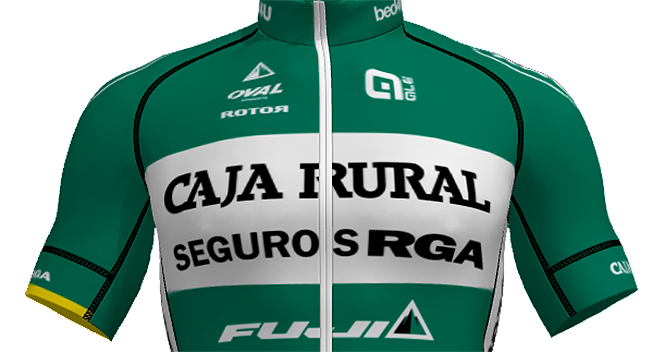Eduard Prades (Caja Rural-Seguros RGA) has found the sporting and personal stability later than he would have liked – in Germany. The Spaniard has currently escaped the cold and is training in Spain to prepare for his second season at the pro level.
The Catalan rider showed his quality in the second half of 2015 and added two victories, a stage in the Volta a Portugal and the Coppa Sabatini in Italy, and paid back the confidence shown by Caja Rural-Seguros RGA. "To finish the season with wins gives you extra moral for the coming year. I started badly with a physical problem - a wound on a toe – but I improved during the year and finished with a confidence booster." The injury was difficult to overcome. "I got nervous because now I had been given a chance and I could see that everything went wrong and I started to worry. It was nice because I was still fifth in a stage of the Vuelta a Andalusia, but it was limited. I had to be patient because it was a sensitive wound with a continuous friction. It took a month and a half to recover,” he told BiciCiclismo.
With the good taste in the second half of the season, he now hopes to "continue the progression that I have made shown every year and now with a good calendar and riders at many levels. I want to continue to grow".
Since August he has changed his life by moving to Stuttgart, Germany. "My girlfriend Cristina Aznar - the ex-rider – has been there for two years. She first studied as part of the Erasmus program and then found a job as an architect. In Spain there were not many perspectives. There are roads everywhere. It was a step that we had to take. We have known each other for five and a half years and are almost always together because we lived apart 100 kilometers," he said.
He moved from the centre of Stuttgart to Gülstein in Herrenberg, about 30 kilometers away. "We looked for a house to train well and without traffic. I have a normal life. I don’t have much of a relationship with anyone, except for the neighbor," he joked. "The coexistence goes well. It is better to live together than separately because the distance was a barrier. On quiet days we can ride together, especially in weekends. When it is very cold, I'll go down to Spain because Tarragona is good all year," he smiled.
Prades underlines the differences in mentality and cultural relations between Germany and Spain. "The people have no problem in changing job. There is a lot of movement and people constantly change job when they have better prospects. It's a different philosophy and the truth is that I like it. In Spain, people want to have a job, a house and not move anywhere. And I think that has to change because the world is changing. Being always in one place is over and companies will demand it," he explained.
He does not see big differences in prices. "We can go for dinner for a cheaper price than in Spain. For example, I really like pizzas. They cost 8-10 euros in Spain and here I can get them for 6-8 euros. Drinks, fish and some vegetables are more expensive. It is not true that everything is more expensive. Gasoline is the same, also houses more or less, there is not the kind of difference that people talk about. Yes, there is 3% unemployment." The parties are different though. "The festivities end at 12. My girlfriend told me that when she arrived at a party, 12 people went home. And it's true," he said.
One detail that has attracted his attention is the use of bicycles. "In Spain we make limits everywhere. Here, on the contrary, the bikes have free rein. Everything is based more on common sense. This is normal. A bicycle is not a hindrance, it is part of everyday life. You can go everywhere, in a park, on the sidewalk as if you were a pedestrian. It is easier to train on the road. There are parallel paths and when you are on the road, cars will pass in a fair way with much respect for the bikes. In Spain, people complain a lot and there are accidents, but here the respect is bigger. The downside is that there are obstacles in towns and cities,” he lamented.
His arrival at the pro level was not easy: he debuted in Andorra in 2009, but had to ride as an amateur for three years before he opened the door to Portugal. Last year he competed in Japan. He admits that he often thought about retirement. "When I stepped down to amateur level for three years, the opportunities didn’t come. Other riders moved up but I stayed where I was. I did not get what I wanted. The year I spent in Portugal was good. The Volta Algarve was a step. Only Contador, Kwiatkowski and Rui Costa were with me in the mountains and that was a very important step," he said.
There were not many alternatives to cycling. "There was not much I could do. I have a career in physical education . In the team they gave me a decent wage and so allowed me to have an income. So I could survive by riding my bike,” he recalled. He did one year with the Japanese Matrix team in late 2014 and recently visited Osaka. “My brother (Benjamin) is still there. I was there for 12 days and visited Tokyo, Hiroshima ... I've got friends there," he concluded.
| Raoul LIEBREGTS 49 years | today |
| Andrew ROCHE 53 years | today |
| Jay DUTTON 31 years | today |
| Rolando AMARGO 28 years | today |
| Serge JOOS 40 years | today |
© CyclingQuotes.com









